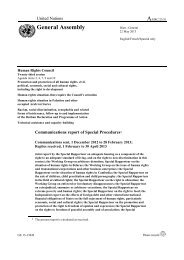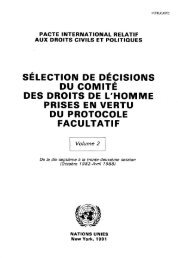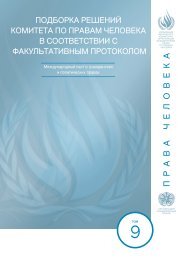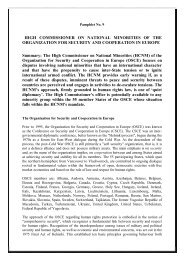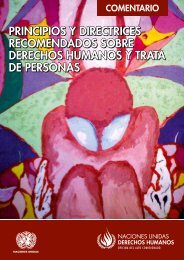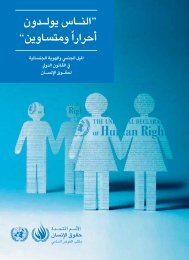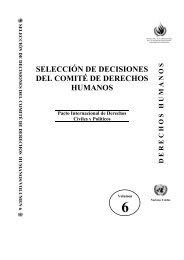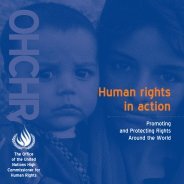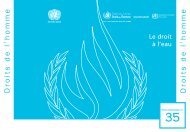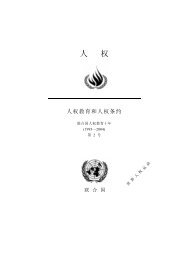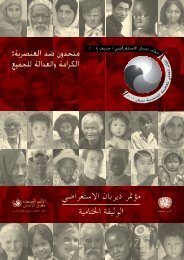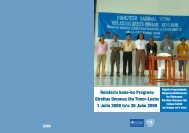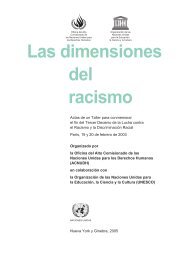good governance practices for the protection of human rights
good governance practices for the protection of human rights
good governance practices for the protection of human rights
Create successful ePaper yourself
Turn your PDF publications into a flip-book with our unique Google optimized e-Paper software.
Implementation<br />
Social activists have relied on mobilization tactics and public action in <strong>the</strong>ir<br />
fight against corruption in public expenditures. Through <strong>the</strong> slogan “our<br />
money – our accounts,” social activists and villagers have demanded that<br />
local administrators provide <strong>the</strong>m with an account <strong>of</strong> expenditures in development<br />
projects in <strong>the</strong>ir region. The activists have demanded access to bills,<br />
vouchers, receipts, approvals, evaluations and audited accounts from local governments<br />
to see how public money has been spent. The public hearings have<br />
attempted to turn “subjects into citizens and recipients into actors.” Although<br />
many villagers are illiterate, through face-to-face public hearings, <strong>the</strong>y are<br />
able to question <strong>the</strong>ir representatives and make <strong>the</strong>m answerable on <strong>the</strong> basis <strong>of</strong><br />
evidence.<br />
The practice <strong>of</strong> social auditing met with resistance from local governments. Social<br />
activists were <strong>of</strong>ten denied access to documents, such as bills and vouchers,<br />
by <strong>the</strong> local administration, but <strong>the</strong>y held public hearings regardless. At one such<br />
public hearing, a few people testified that local village <strong>of</strong>ficials had extracted<br />
money as commission <strong>for</strong> a government housing grant to local families. Within<br />
48 hours <strong>of</strong> this revelation, <strong>the</strong> money was returned to <strong>the</strong> families.<br />
Recognizing <strong>the</strong> importance <strong>of</strong> legislation to secure <strong>the</strong> right to in<strong>for</strong>mation, social<br />
activists also initiated a campaign pushing <strong>for</strong> right-to-in<strong>for</strong>mation legislation.<br />
In April 1995, <strong>the</strong> Government <strong>of</strong> Rajasthan announced to <strong>the</strong> Legislative<br />
Assembly that it would provide access to in<strong>for</strong>mation to citizens on all local<br />
developmental works, but took no action. A year later, in April 1996, an indefinite<br />
sit-in or dharna was organized to demand that <strong>the</strong> State Government pass<br />
executive orders to provide a limited right to in<strong>for</strong>mation on local development<br />
expenditure. The Government’s issuance <strong>of</strong> an order to inspect relevant documents<br />
on <strong>the</strong> payment <strong>of</strong> fees was rejected by <strong>the</strong> activists as it did not permit<br />
photocopies to be made <strong>of</strong> <strong>the</strong>se documents. In 1996, <strong>the</strong> National Campaign <strong>for</strong><br />
<strong>the</strong> People’s Right to In<strong>for</strong>mation was <strong>for</strong>med and ano<strong>the</strong>r series <strong>of</strong> dharnas took<br />
place, expanded to <strong>the</strong> State capital, and continued <strong>for</strong> 52 days. At <strong>the</strong> end <strong>of</strong><br />
this period, <strong>the</strong> State Government confirmed <strong>the</strong> right to photocopy <strong>the</strong> relevant<br />
State documents.<br />
Following extensive consultation between MKSS and o<strong>the</strong>r civil society actors<br />
and <strong>the</strong> Government, <strong>the</strong> Rajasthan Right to In<strong>for</strong>mation Act was passed in 2000<br />
and came into <strong>for</strong>ce in January 2001.<br />
Impact on <strong>human</strong> <strong>rights</strong> and challenges<br />
Social audits exposed <strong>the</strong> misdeeds <strong>of</strong> local politicians, private engineers and<br />
government contractors, leading in a number <strong>of</strong> cases to voluntary restitution.<br />
These ef<strong>for</strong>ts yielded concrete results and benefited <strong>the</strong> poor: embezzled money<br />
was returned, projects were completed, <strong>the</strong> delivery <strong>of</strong> services improved and<br />
administrative or legal sanctions were imposed on corrupt <strong>of</strong>ficials.<br />
67



